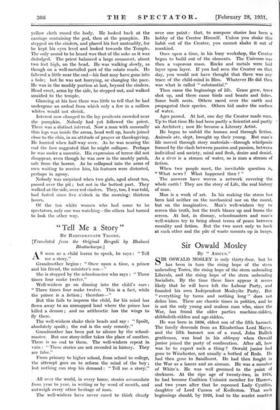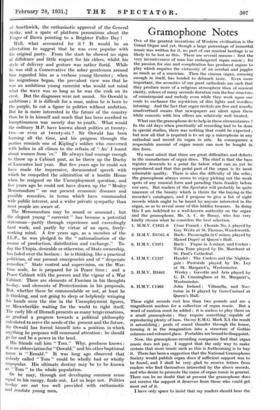Sir Oswald Mosley By " Amrcus."
SIR OSWALD MOSLEY is only thirty-four, but he has been in turn the rising hope of the stern unbending Tories, the rising hope of the stern unbending Liberals, and the rising hope of the stern unbending Socialists. By the time these lines appear it seems likely that he will have left the Labour Party, and founded his own Independent Mosleyite Party. But "everything by turns and nothing long" does not define him. These are chaotic times in politics, and he is not the only young and zealous man who, since the War, has found the older parties machine-ridden, shibboleth-ridden and age-ridden.
He was born in 1896, eldest son of the fifth baronet. The family descends from an Elizabethan Lord. Mayor, and the fifth baronet son of a rural, John Bullish gentleman, was loud in his obloquy when Oswald junior joined the party of confiscation. After all, how was he to expect such a thing ? Oswald junior had gone to Winchester, not usually a hotbed of Reds. He had then gone to Sandhurst. He had then fought in the War as a lancer and an airman. He was a member of White's. He was well groomed to the point of sleekness. At the ripe age of twenty-two, in 1918, he had become Coalition Unionist member for Harrow, and two years after that he espoused Lady Cynthia, daughter of Lord Curzon of Kedleston. That such beginnings should, by 1926, lead to the scarlet rosettes of Smethwick, the enthusiastic approval of the General Strike, and a spate of platform perorations about the Finger of Davin pointing to a Brighter Fuller Day !
Well, what accounted for it ? It would be an affectation to suggest that he was ever popular with his original party. From the start he showed no signs of diffidence and little respect for his elders, whilst his style of delivery and gesture was rather florid. While he was still a Conservative the sober gentlemen around him regarded him as a verbose young thruster ; when his migrations began, the prevalent view was that he was an ambitious young careerist , who would not mind what the wave was so long as he was the cork on its crest. But the diagnoses were not sound. Sir Oswald is ambitious; it is difficult for a man, unless he is born to the purple, to cut a figure in politics without ambition. But he is more interested in the future of the country than he is in himself and much that has been ascribed to bumptiousness was merely due to youth. What would the ordinary M.P. have known about politics at twenty- two—or even at twenty-six ? Sir Oswald has been learning all the time, and his progress through the parties reminds one of Kipling's soldier who conversed with ladies in all climes to the refrain of "An' I learnt about women from 'er." He always had courage enough to throw up a Cabinet post, as he threw up the Duchy of Lancaster last year. But five years ago he could not have made the impressive, documented speech with which he compelled the admiration of a hostile House when he resigned on the Unemployment question, and five years ago he could not have drawn up the "Mosley Memorandum" on our present economic diseases and possible remedies, in terms which have commanded wide public interest, and a wider private sympathy than most people are aware of.
The Memorandum may be sound or unsound ; but the elegant young " careerist " has become a potential statesman—partly through experience and exceedingly hard work, and partly by virtue of an open, freely- working mind. A few years ago, as a member of the I.L.P., he was pledged to the "nationalization of the means of production, distribution and exchange." To- day the Utopia, desirable or otherwise, of State ownership, has faded over the horizon : he is thinking, like a practical politician, of our present emergencies and of "desperate remedies." State control and supervision, on the War- time scale, he is prepared for in Peace time ; and a Peace Cabinet with the powers and the vigour of a War Cabinet. There are elements of Fascism in his thoughts to-day, and elements of Protectionism in his proposals. l3ut, whether these be commendable or not, at least he is thinking, and not going to sleep or helplessly wringing his hands over the rise in the Unemployment figures, or Micawberlike waiting for the world to right itself. The early life of Disraeli presents as many tergiversations, as gradual a progress towards a political philosophy calculated to serve the needs of the present and the future. Sir Oswald has forced himself into a position in which anything he. proposes will command attention: he should go far and be a power in the land.
His friends call him "Tom." Why, goodness knows : it is no abbreviation for "Oswald," and his other baptismal name is -" Ernald." It was long ago observed that nobody called "‘ Tom " could be wholly bad or wholly unpopular. His ultimate destiny may be to be known . . _ • as " Tom " to the whole population.
Or he may, through not developing common sense equal to his energy, fizzle out. Let us hope riot. Politics to-day are not too well provided with enthusiastic and reSolute young men.












































 Previous page
Previous page